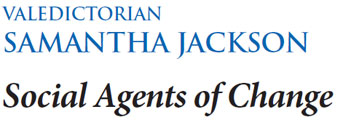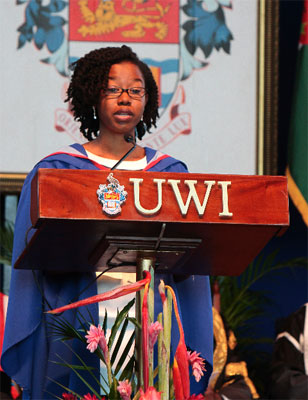|
December 2013

Issue Home >>
|

 
Congratulations, my peers. After all our hard work, commitment and sacrifice, today we can finally proudly call ourselves graduates of The University of the West Indies!
As graduates, most of us are returning to or entering the working world and we all want to be successful. Modern society is concerned with completing projects efficiently and effectively, and this requires people who can both strategise, and accomplish goals. Being goal-oriented and ambitious are undeniably valuable attributes, but they will only get you so far. To accomplish great things we must not only act, but also dream; not only plan, but also believe.
You may wonder how dreaming, which distances us from reality, could be essential to achieving realistic goals; and the ways in which believing is vital to successful planning may not be immediately obvious. But, if you think about it, you’ll see that the Faculty of Humanities and Education has taught you these skills. For example:
Film and the performing arts aren’t just about stagecraft and acting. We must first introspect then collaborate and collectively perceive the big picture. And we must genuinely commit to the roles we assume within our productions if we expect others to suspend their disbelief.
The best educators are those who have a vision for their students and for the future of humanity. Those who link their strategies to their aspirations and believe ardently that we can make a difference in students’ lives.
Literature and Linguistics scholars cultivate critical thinking skills that allow us to envision new ideas in HD while everyone else is stuck with their standard definitions. Because we can imagine new worlds and identify flaws in this one, we can carefully develop appropriate solutions and be active, contributing members in our communities, fervently devoting ourselves to our cause.
In these ways and in so many more, this Faculty has taught us to act and dream; to plan and believe—and thereby has empowered us to successfully navigate life.
 We may leave the UWI, but the UWI will never leave us. It’s important to remember that all the places we come from make us who we are. For me, being a “Convent girl” led me to have high standards for myself and others. Attending COSTAATT changed the way I view life and inspired me to want to contribute to society. And now, as a UWI graduate, I have more knowledge and confidence than I ever would have anticipated, and a love for a field that I hadn’t even known existed. Every period in our lives contributes to our personality and on this day, we are all thankful for the opportunity that the UWI gave and that we took, to improve our education and our lives. We may leave the UWI, but the UWI will never leave us. It’s important to remember that all the places we come from make us who we are. For me, being a “Convent girl” led me to have high standards for myself and others. Attending COSTAATT changed the way I view life and inspired me to want to contribute to society. And now, as a UWI graduate, I have more knowledge and confidence than I ever would have anticipated, and a love for a field that I hadn’t even known existed. Every period in our lives contributes to our personality and on this day, we are all thankful for the opportunity that the UWI gave and that we took, to improve our education and our lives.
It isn’t only the institution that we have to thank, though. People, as much as places, make us who we are. My first year of UWI was horrible. I was intimidated by the institution and I just didn’t think I could do it. It was then¬¬—and always—that it was vital to have a support system of genuine friends and excellent mentors. People who can keep you on track and make you feel better when you had a bad day or tell you to stop playing the fool when you are; people who will listen to your academic problems even if they have no idea what you’re talking about. And so we all have our parents, loved ones, friends and peers to thank for helping us to get to this point. In a way, we even have our bad group members to thank because they helped us to be more self-reliant and flexible! But a special thank you, of course, must go to those hardworking geniuses who dealt with more than their fair share of stress for our sakes—we must say thank you to our lecturers for the integral role they played in our success.
The UWI is a microcosm of the Caribbean region. As such, we can reasonably expect the habits that we acquired during our UWI experience to stay with us and even spread to others when we return to our respective hometowns or go out into the world to further our careers, lives or education. Therefore, it’s essential that I not only tell you about dreaming and believing, but also about acting and planning. All four are equally important, and acting and planning are interesting because in our UWI lives, we may have picked up the bad habit of not doing them. For instance, we complained about many aspects of our schooling; from Student Administration and unreliable internet to course content to lecturers’ teaching styles, but when someone presented us with the opportunity to engage, whether via protest, confrontation or discussion, how many of us grasped that opportunity? We’ve all had those instances where lack of proper time management led to us pulling the famous UWI all-nighter. And, admittedly, even I have been complacent enough to almost excuse the allegations of financial mishandling by a candidate for student elections because so many are indifferent to corruption in my country. I beg you; please get rid of these bad habits as you leave this mini-Caribbean for the real Region. We all want better for ourselves, our countries and our Region. And that means we all have to be creative and dedicated, but these won’t mean anything without being social agents of change as well.
So, now that you have graduated, don’t be afraid to take part in society. Don’t be indifferent about reckless or drunk driving—in our time here alone, we have lost too many students to these practices. Don’t turn a blind eye to littering, bullying in its different forms and general lawbreaking. Don’t be afraid to hold people, including yourself, accountable for things they promise to do and things they should be doing. When someone says, “Vote for me and I will set you free,” use those critical thinking skills FHE gave you and ask, “How?” Evaluate their response and refuse to be the typical person who only remembers what they said for two weeks. If your country’s prospects aren’t looking positive, aim to improve your future. Criticise, of course. But plan. Be serious about making that plan a reality. And act. Only then will you be a true exemplar of a UWI FHE graduate. And only then, you can be sure, will you accomplish great things.
This is the valedictory address given to graduates of the Faculty of Humanities and Education, UWI, St Augustine, on October 26, 2013.

|





